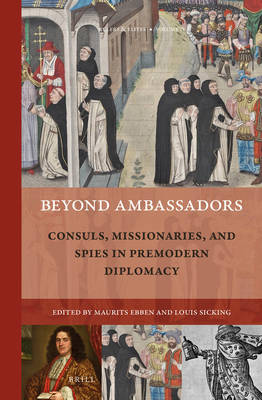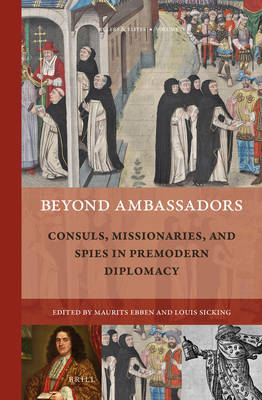
- Afhalen na 1 uur in een winkel met voorraad
- Gratis thuislevering in België vanaf € 30
- Ruim aanbod met 7 miljoen producten
- Afhalen na 1 uur in een winkel met voorraad
- Gratis thuislevering in België vanaf € 30
- Ruim aanbod met 7 miljoen producten
Zoeken
Beyond Ambassadors
Consuls, Missionaries, and Spies in Premodern Diplomacy
€ 121,41
+ 242 punten
Omschrijving
Because of the overarching shadow of 'the state' in all things diplomatic, traditional diplomatic history has neglected the study of any actors in foreign relations other than state diplomats, such as ambassadors. This volume focuses on the question of how and why consuls, missionaries, and spies not formally tied to the state or a prince could play a role in premodern diplomatic relations. It highlights their multiple loyalties, their volatility, and the porous boundaries of diplomatic activity. Historical research on non-state actors - in the context of the so-called new diplomatic history - is all the more urgent as it demonstrates their undeniably significant contributions to the formation of Europe's international relations.
Contributors are: Maurits Ebben, Dante Fedele, Alan Marshall, Jacques Paviot, Felicia Roșu, Jean-Baptiste Santamaria, Louis Sicking, and John Watkins.
Contributors are: Maurits Ebben, Dante Fedele, Alan Marshall, Jacques Paviot, Felicia Roșu, Jean-Baptiste Santamaria, Louis Sicking, and John Watkins.
Specificaties
Betrokkenen
- Uitgeverij:
Inhoud
- Aantal bladzijden:
- 236
- Taal:
- Engels
- Reeks:
- Reeksnummer:
- nr. 19
Eigenschappen
- Productcode (EAN):
- 9789004438842
- Verschijningsdatum:
- 10/09/2020
- Uitvoering:
- Hardcover
- Formaat:
- Genaaid
- Afmetingen:
- 160 mm x 236 mm
- Gewicht:
- 476 g

Alleen bij Standaard Boekhandel
+ 242 punten op je klantenkaart van Standaard Boekhandel
Beoordelingen
We publiceren alleen reviews die voldoen aan de voorwaarden voor reviews. Bekijk onze voorwaarden voor reviews.










